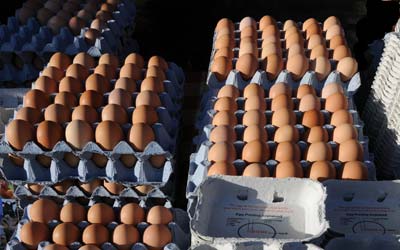The egg has been recorded in cooking since Greek and Roman times and is most commonly the egg of a hen, though you may also find duck, gull, quail and goose and many others. A hen's egg provides about 14% of required protein and contains amino acids, with about 1.5 g fat of which about half is unsaturated, and also contains vitamins D, A and E and some B vitamins.
Eggs can be a source of salmonella, though risks are being reduced by vaccinating flocks of laying hens. It is worth making the small additional investment if you can of eating eggs from contented chickens.
If you are boiling eggs it is often better to select a slightly older egg, particularly for hard-boiling, and cook them as slowly as you can. Fresh eggs don't float.
